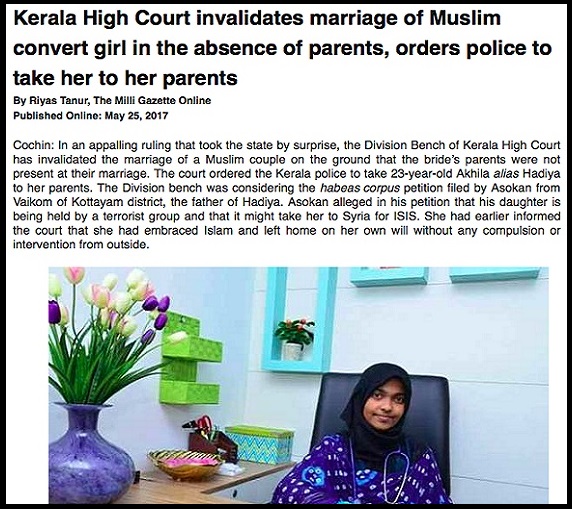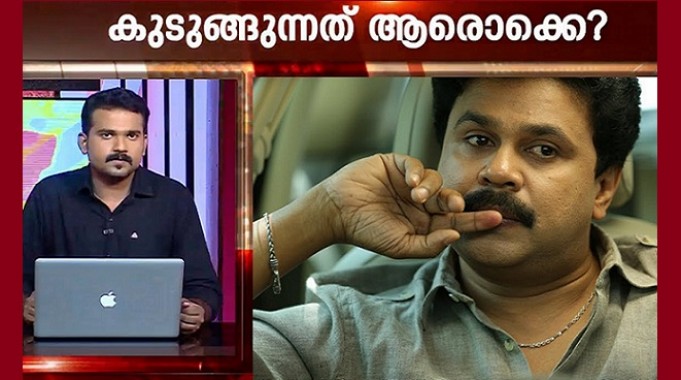A tale of two Kerala women and the media
Actor dilip who was arrested on july 10.
A comparison of how the Kerala media have covered two recent incidents in which two women were wronged may be helpful to understand the absence of professionalism in the mainstream journalism in the state today.
One was a sexual attack against a prominent film star in February by a group who are, allegedly, linked to some top figures in the Malayalam film industry. The issue appeared again on newspaper front pages last week after the police made some progress in the investigation and called actor Dileep and director Nadirshah for questioning. As Dileep was arrested on July 10 the story is likely to be very active again on media on the days to come.
The other is the case of Hadiya, also known as Akhila, a 24-year old physician whose marriage was, on May 24, nullified by the Kerala High Court and who was forcefully sent to the custody of her father against her wishes. “A girl aged 24 years is weak and vulnerable, capable of being exploited in many ways,” the HC said in its controversial judgment.
The Court issued the verdict on a habeas corpus petition filed by Hadiya’s father. Hadiya had become attracted to Islam while doing her medical course and had decided to embrace the religion. Later, through a matrimonial website, she met and married a Muslim man.
Differential treatment
While the news media in Kerala in general have gone almost crazy about the first case, the story of Hadiya, despite its significance and news worthiness, has failed to attract the media attention it deserves. While they are very different from each other, in both cases, an individual woman has been wronged; in both cases, the victims, despite on the face of it being privileged – an actor and doctor – are still waiting for justice.
After the attack on the actress, the police have so far arrested at least four, including Dileep, and questioned several others. But, at the earlier stage of the investigation, the moment there was speculation that some top names in the film industry were involved in the incident, the media went berserk in covering the issue, with unverified claims and minor developments becoming front page news.
For example, a lead story in Mathrubhumi, a major daily, on July 3 prominently reported that the police had secured the footage of the assault on the actress. A couple of days later, another leading newspaper quoted the state police chief and reported that the footage had been with the police since March.
Since the police questioned Dileep and Nadirshah, two important figures in the Malayalam film industry, speculation was high that the duo may have a role in the episode and be arrested soon. So, on subsequent days, this kind of speculation ran on the front pages of many newspapers.
For several consecutive days, some newspapers, along with other media, repeatedly predicted ‘immediate’ arrests. But no such arrest happened until July 10, when Dileep was arrested.

Compare this with the silence about the Hadiya case. The indifference of many media groups was noticeable, even though it was apparent that her fundamental rights had been violated. Many newspapers filed not a single story after Hadiya was forced back to the parental home by the HC. Leading newspapers such as Malayala Manorama, Mathrubhumi and Madhyamam are among them.
When contacted, journalists from these newspapers admitted that their respective bureaus in Kottayam district, where Hadiya is now under house arrest, have not covered her. A journalist from the Kottayam bureau of Malayala Manorama said that the newspaper carried no story on Hadiya from the bureau. “All stories were carried from Ernakulam,” he said, referring to the fact that the only story the daily reported on her was related to the proceedings of the High Court, which is located in Ernakulam.
Journalists are not allowed to meet Hadiya. She can’t be approached through other means too, as she is denied access to any communication device. It’s true that the HC asked the police to ensure her ‘protection’ and ‘safety’, as well as that of her parents but what the police are doing is something different: Hadiya continues to be under house arrest, unable to get in touch with the outside world.
While the mainstream media continues its silence, some online portals have carried reports on her. These reports have talked about the young woman’s life has been disrupted and how her rights have been violated by both the judiciary and the police.
One such report, by K. R. Dhanya of Azhimukham, an online news portal that reported how Hadiya had been forcefully shifted to her parents’ custody and her marriage made ‘invalid’, says that the continuing loneliness has started to affect Hadiya’s mental health.
“Hadiya, though being non-cooperative with her family, had earlier behaved well with the police officials who were staying with her. But now she remains silent to everyone. She always sits in her room and reads the Qur’an. Sometimes, she responds to questions angrily … We think that her continuing condition, of being forced to live alone under the watch of a police team, has severely affected her mental health,” an unnamed police official was quoted by the news portal as saying.
The news website’s other exclusive story on the issue, published on June 10, also narrated Hadiya’s alarming living conditions and abuse of her rights.
Indifference of mainstream media
However, in clear contrast to the coverage of the assault against the actress, the mainstream media gave very little coverage to the powerful and disturbing story of Hadiya. Nor have they cared to ask the authorities for an explanation as to why Hadiya continues to be under ‘house arrest’ and continues to be denied access to a mobile phone and the internet. Even letters are not delivered to her.
Her husband, Shafin Jahan, whose marriage was declared to be “null and void” by the Kerala High Court, approached the Supreme Court last week for justice. His petition said the Kerala High Court order was an “insult to the independence of the women of India as it completely takes away their right to think for themselves”.
Jahan asked the Supreme Court to direct the police to produce Hadiya before the Court. He asked in his petition whether “the High Court can declare a marriage between two educated adults and mentally fit persons of India, as null and void, against their will?”
Given that journalists who wanted to meet Hadiya have been denied access to her, the issue becomes one of media freedom too. The journalists’ right to do their job, to cover a relevant issue, has been blocked with no explanation.
The police, one reporter noted, wants reporters to produce ‘special permission’ from the High Court if they want to meet Hadiya. No media organization or journalists’ body has registered its protest against this gag.
Hadiya’s case raises profound questions about a woman’s freedom to choose, about her right to self-determination, about religious freedom and press freedom. Yet for most of the Kerala media, this remains a non-issue. More’s the pity.
Muhammed Sabith, an independent journalist and researcher, can be reached at sabith.muhemmad@gmail.com







